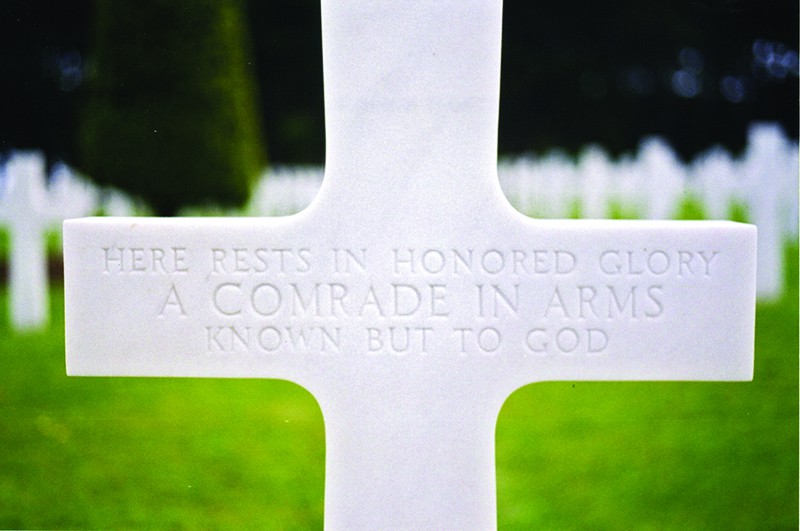Only as he leaned forward into the sunlight could we see the slashing scar almost hidden in the topography of his face, running from his hairline to his jaw.
“Just one day, boys,” he said. “Normandy. June 6, 1944.” His eyes glistened; perhaps a bit more moist than age had graced him with. Memories, I thought; the memories of one very long day.
Every vet present made their way to him, some with great difficulty, to grasp his right hand and murmur respects. I didn’t get his name, and don’t need it. I will never forget his face.
Lest We Forget
Indulge me, please. I want to share some scattered memories, fragmented because my thoughts are not, well — orderly. Because I can no longer seek their permission, my relatives will only bear initials. Their names, like that of the smiling vet on the bus, aren’t really important anyway. Their stories are.
On D-Day, Uncle BC flew over the beach at Normandy en route to bomb a crossroads. He knew his brother-in-law, the man who married his eldest sister, was landing in the first wave below. He saw masses of small figures, and it chilled him that so many lay still. He wondered if the invasion had already failed.
That rifleman, Uncle AS, survived, injured but not stopped by rocks falling in the narrow defile he climbed to reach the bunkers above the beach. He recalled, “I felt better once I got into the bunkers, because they could only shoot me in there, not shell me, and I shot them first.”
Later, Uncle AS was gravely wounded at the Battle of the Bulge, where his helmet was blown off and his scalp burned to the bare skull by blazing fuel. Uncle BC flew 75 missions over Fortress Europe, and although several of his B-17 crewmembers were killed or wounded, he suffered only frostbite and cuts from debris.
His favorite story was of a forced landing in an English meadow with one engine dead and one on fire. The local fire brigade enthusiastically but inaccurately put out the blaze, dousing the plane and everyone present; then took them to the village for tea served in fine bone china on white linen. Their cups were heaped with precious rationed sugar. They left wet black sooty smudges on everything — and their apologies when they left. When he returned home, his curly dark hair had turned snow white and remained so the rest of his days.
Cousin RM’s plane was shot down on a mission to Belgium. He was captured, sent to a German POW camp and returned “a haunted scarecrow.” A few months later he walked into the woods with pack and rifle and was never seen again. Kids noticed his snowshoes were strapped on his pack, though it was early fall.
Cousin JB was killed in North Africa on a flower-strewn rocky slope. His older brother was a 100 yards away and saw it happen. JB’s best friend from back home was at his side, because he had a twisted ankle and JB was helping him over rough spots. After the war he wept when he told my mother.
“He was shot so many times — so many times he couldn’t even fall for a minute! I could have reached out and touched him, and I never got so much as a scratch.”
JB rests in the American military cemetery in Carthage, Tunisia, among 20-plus acres of grave markers. Four pairs of brothers lie together in one row. It is a well-tended place, quiet and peaceful; close enough to the Mediterranean to catch salt breezes ruffling its many shady trees. Most Americans are unaware of its existence.
Dad began the war on the gundeck of his destroyer in Pearl Harbor on December 7, 1941 — a story in itself for another time. He went on to survive the battle of Coral Sea, the freezing horrors of the now-forgotten fight for the Aleutians, and the vicious naval battles fought at night in the “slot” off Guadalcanal called Iron Bottom Sound, so named for the blasted hulls of warships littering that watery graveyard.
He went ashore on Guadalcanal “to chat with some Marines about directing naval gunfire” and promptly got popped in the hip by a sniper. It didn’t dampen his sense of humor. As he wrote in his prohibited wartime diary, “Better hit by a 6.5 Arisaka than a 14-incher — smaller hole and no HE (high explosives).”
More Bad News
Dad went on to pick up a chunk of shrapnel in the left side of his head at Tinian, near Saipan, in late 1944. The headaches were excruciating; debilitating. He swore his ship’s chief medical corpsman to a secret conspiracy to keep him in painkillers and in the fight.
When the bombs finally dropped on Hiroshima and Nagasaki, he was preparing for the invasion of the Japanese home islands, estimated to cost as many as 1,000,000 American casualties. By that time four more family members were in uniform, in the Pacific theatre, and would certainly have been fed into the jaws of that monster. Not one of them had reached their 19th birthday.
Dad wrote in his diary, “It is finished. On watch I will write to Dottie, Betty, June and Geraldine, tell them Your boys will come home.”
If, on November 11th, you have no veterans to remember, please share mine. I have plenty; almost too many to bear.
Connor OUT
